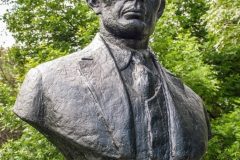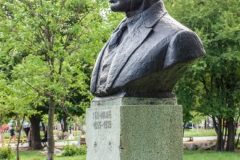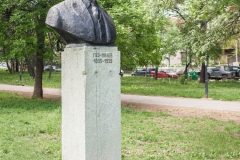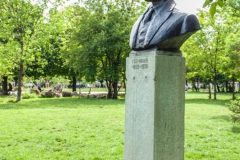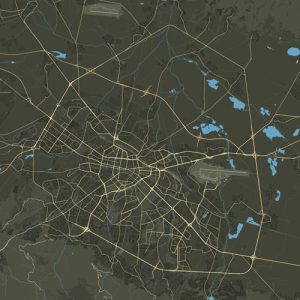The bust-monument of Geo Milev is located in the park of the capital district of the same name.
Georgi Kasabov Milev was born on January 15, 1895 in Radnevo. While he was still a child, the family moved to Stara Zagora and there in 1911 the future poet graduated from high school. It was in high school that the young man became very fond of literature, appearing in a variety of roles – poet, translator, humorist, illustrator. He briefly studied Romance philology at Sofia University, and then continued his higher education in Leipzig, where he devoted himself to philosophy and theatrical art. He is also fascinated by modern German poetry.
After the beginning of the First World War, he went to London and got acquainted with English literature. In 1915 he returned to Bulgaria, and in 1916 he was mobilized to the school for reserve officers in Kniazhevo. Georgi Milev served in the 34th Trojan Regiment and took part in the Doiran epic, and during an enemy artillery shelling in 1917, he was seriously wounded in the head and lost one of his eyes. He spent the following years in Germany, where he underwent several operations and there witnessed the new phenomena in German literature that arose after the defeat of Germany in the war. In 1919, the poet returned to Sofia and began publishing the magazine “Libra”, which quickly became a forum for symbolists and impressionists in Bulgaria. The socio-political life in the Motherland and the problems between farmers and the People’s Agreement changed the views of the young artist and he became more and more radicalized.
In 1924, the magazine “Flame” began to be published, in which the poem “September”, the most famous work of Geo Milev, was published. After the attack in the “Sveta Nedelya” church, Geo Milev, like many left-wing intellectuals, stands before the court. Because of the poem “September”, on May 14, 1925, he was sentenced to 1 year in prison, a fine of BGN 20,000 and deprivation of civil and political rights for 2 years. The poet appealed his sentence, but on May 15 he was arrested and disappeared without a trace. In the 1950s, remains were found in a mass grave in Iliantsi, which are supposed to be those of the poet, who was most likely killed by the perpetrators of the “white terror”.

